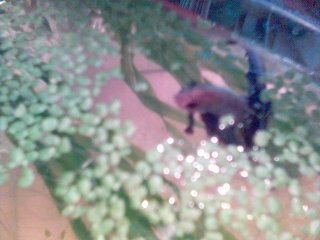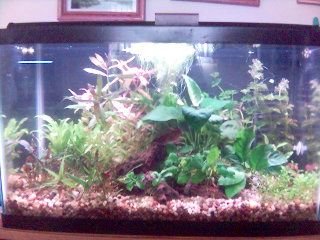Scientific name - Lemna minor
Common terms - Duckweed
Geographic origin - Worldwide distribution
Type (stem, bulb, rhizome, floating, etc.) - floating
Max. size (height, width) - leaves are 2-3mm long, fine roots can extend down 7+cm
Lighting required - low-high
Temperature - 10-30C
Water chemistry requirements (pH, hardness) - unimportant, thrives in various conditions
Growth rates - very fast
Demands - undemanding, very easy to grow
Additional info - Though often considered a pest in planted aquariums, Duckweed can actually be quite useful. It's long roots and fast growth make it a strong competitor with algae for tank nutrients. It can also be used to shade plants in the aquarium that require lower light levels (anubias, cryptocrynes, etc.). In addition, duckweed can provide a refuge and food source, via microscopic organisms, for young fry, and provide an anchor for bubble nesting species. If not regularly thinned, however, duckweed can cover the entire surface of an aquarium in a matter of days. Also, if starved for nutrients, the leaves turn white and the plant dies. Duckweed reproduces by division. Below are three photos featuring duckweed. The top photo is a close-up of the individual plants. The bottom photo on the left is of my betta tank 5 days after a small cluster of duckweed, about 10 plants, was introduced. The photo on the right demonstrates duckweed's useful function as a shade provider. Here is quite a large cluster shading my anubia in my 10g. You can see the extensive maze of roots formed by hundreds of tiny plants.


Common terms - Duckweed
Geographic origin - Worldwide distribution
Type (stem, bulb, rhizome, floating, etc.) - floating
Max. size (height, width) - leaves are 2-3mm long, fine roots can extend down 7+cm
Lighting required - low-high
Temperature - 10-30C
Water chemistry requirements (pH, hardness) - unimportant, thrives in various conditions
Growth rates - very fast
Demands - undemanding, very easy to grow
Additional info - Though often considered a pest in planted aquariums, Duckweed can actually be quite useful. It's long roots and fast growth make it a strong competitor with algae for tank nutrients. It can also be used to shade plants in the aquarium that require lower light levels (anubias, cryptocrynes, etc.). In addition, duckweed can provide a refuge and food source, via microscopic organisms, for young fry, and provide an anchor for bubble nesting species. If not regularly thinned, however, duckweed can cover the entire surface of an aquarium in a matter of days. Also, if starved for nutrients, the leaves turn white and the plant dies. Duckweed reproduces by division. Below are three photos featuring duckweed. The top photo is a close-up of the individual plants. The bottom photo on the left is of my betta tank 5 days after a small cluster of duckweed, about 10 plants, was introduced. The photo on the right demonstrates duckweed's useful function as a shade provider. Here is quite a large cluster shading my anubia in my 10g. You can see the extensive maze of roots formed by hundreds of tiny plants.


